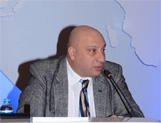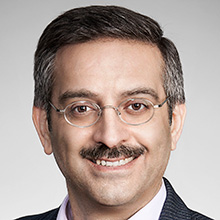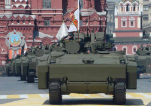The Emerging Azerbaijan-Gulf Partnership in Energy[Over]
 By Fuad Shahbazov, Baku-based independent regional security and defence analyst By Fuad Shahbazov, Baku-based independent regional security and defence analyst
On January 8, Mohammad bin Zayed Al-Nahyan (MBZ), the leader of the United Arab Emirates (UAE), paid an official visit to Azerbaijan upon the invitation of his counterpart, President Ilham Aliyev. While MBZ’s visit to Baku signaled an era of deepening economic and energy ties between Azerbaijan and the UAE, it also reflected significant progress made in recent years. Indeed, the bilateral relationship has seen a raft of new projects and investments, particularly in the renewable energy sector. Notably, according to 2022 data, the Gulf countries are now among Azerbaijan’s top investment partners, though reciprocal investment remains low, compared to Azerbaijan’s other partners. READ MORE
New Russian Embargo - Collapse for Georgian Economy or Historic Chance?[Over]  By Nika Chitadze, PhD, Director, Center for International Studies, International Black Sea University, Tbilisi By Nika Chitadze, PhD, Director, Center for International Studies, International Black Sea University, Tbilisi
By Putin's order, flights to Georgia from Russia will be prohibited from July 8. Based on past experience, it can be mentioned, that this step from the official Kremlin may not be a catastrophe for Georgia and on the contrary, to be a chance for the better future. The opening of the Russian market during the last several years and the partial settlement of relations with Russia was considered as a means of growth of Georgia's economy, but the developments since 2013 have proved contradictory.
READ MORE
The Other Side of Conflict Resolution: Mobilizing Peace Constituencies in the South Caucasus[Over]  By Elkhan Nuriyev, BREC Global Energy Associate, EGF Affiliated Expert By Elkhan Nuriyev, BREC Global Energy Associate, EGF Affiliated Expert
The international community has so far paid little attention to the South Caucasus where the conflict resolution process is stuck in political limbo for years. This apparent neglect and the lack of understanding of the deep-rooted issues have created an informational landscape where fake news stories harm the ordinary people and violate their fundamental right to make informed choices on the basis of accurate information that is free of deception and manipulation. In effect, the current climate of disinformation aggravates regional tensions and makes incumbent authorities vulnerable to instability. READ MORE
Armenia caught in a peculiar transit trap[Over]  By Benyamin Poghosyan, PhD, Executive Director, Political Science Association of Armenia By Benyamin Poghosyan, PhD, Executive Director, Political Science Association of Armenia
The South Caucasus is facing an infrastructure development boom. However, Armenia is in stark isolation, with no major project passing through the country.
The launch of new transit routes and transport infrastructure are key topics widely discussed within the context of the geopolitics of the South Caucasus. Since the late 1990s several new pipelines, highways and railroads have been constructed traversing the region. Given the re-emergence of Russia as a key player in the post-Soviet space, since President Putin's ascendance to power in 2000, new transport corridors and large infrastructure projects have become factors in the wider competition between Russia and western countries. READ MORE
- February 27, 2018 15:18PM
Russian Defence Industry in the Era of Putin[Over]  By Eugene Kogan, Tbilisi-based defence and security expert By Eugene Kogan, Tbilisi-based defence and security expert
There is a preconceived and very inaccurate perception in the West at large that the Russian Military-Industrial Complex (MIC) has and will continue to have difficulties in the coming years because Russia faces domestic economic challenges caused by the low price of oil, continuing economic sanctions imposed by the EU and the US and the breakdown of defence industrial relations with Ukraine.
There is very little understanding in the West that for President Vladimir Putin the issue of rearmament and well-functioning of the MIC are of crucial importance, and that the Russian president is not ready to give up an inch in tenaciously pursuing this ambitious items on his domestic agenda. READ MORE
- December 18, 2017 22:09PM
New transport corridors in Eurasia leave Armenia with a dilemma[Over]  By Benyamin Poghosyan, PhD, Executive Director, Political Science Association of Armenia By Benyamin Poghosyan, PhD, Executive Director, Political Science Association of Armenia
Armenia should take additional steps to overcome its regional isolation and boost its economic cooperation with the outside world, otherwise in the long-term it would be more and more difficult for it to counter Azerbaijani and Turkish pressure.
On October 30, 2017 an opening ceremony for the newly constructed Baku - Tbilisi - Kars railway link was held in Baku. The Presidents of Azerbaijan and Turkey, as well as the Prime Ministers of Georgia, Kazakhstan and Uzbekistan, and representatives of Kyrgyzstan and Turkmenistan, participated in the ceremony. The BTK was hailed as one of the shortest routes connecting Asia with Europe, with clear eye for it to be included in China's "One Belt - One Road" project. READ MORE
- November 14, 2017 21:01PM
Any Optimism in the Chinese ‘Rooster Year'?[Over]  Mehmet Ogutcu
Mehmet Ogutcu
EGF Affiliated Expert
LONDON - As the world is preparing to leave 2016 behind as a year fraught with political surprises, financial crises and market volatility, governments and businesses including those in Turkey have started to set their eyes on what the next 12 months have in store for them politically and economically.
Clearly, global risks are more elevated and more interconnected than we have ever seen before and demand a proactive and integrated response to address potential impacts. To refresh your memory, since the end of the Bretton Woods order in the 1970s, there have been serious financial crises every seven years over the past 40 years: 1987, 1997, 2007. If you ask me whether the global crisis which has been brewing in the last few years could erupt in 2017, my answer would be yes. READ MORE
Stakeholder Consultation Round Two - Exploring the Role of Economic Initiatives as Peace Building Tools in the Nagorno-Karabakh Context [UPDATED][Over]
The second stakeholder consultation round in EGF's ongoing Nagorno-Karabakh research took place on 06-08 July 2014 in Berlin (Germany), including introduction of a post-conflict scenario building workshop. More than 30 experts from Armenia, Azerbaijan, and international partner NGOs and institutions attended this highly successful event, held in a constructive atmosphere of exchange. It has been the first step towards exploring the idea of a roadmap leading towards an economically integrated South Caucasus, and created a platform for exchange of information between Armenian and Azerbaijani experts. During the post-conflict scenario building workshop, regional participants simulated the negotiation of a roadmap for the implementation of economic components of a peace agreement built upon the Madrid principles, encompassing joint economic measures in areas such as energy, transport, trade, rehabilitation of the territories affected by the conflict, and the return of IDPs to their homeland.
Please click here for the summary of conclusions.
Please click here to see the agenda of the seminar, and participants’ biographies.
Please click here to see the EGF presentation on this research.
The Myths and Realities of Vladimir Putin’s Eurasian Economic Union[Over]  By George Niculescu, By George Niculescu,
Head of Research, The European Geopolitical Forum
Why use the OSCE to take a “jibe” at you know who ?
When on 6 December 2012, in the margins of the OSCE ministerial meeting in Dublin, the US state secretary Ms. Hillary Clinton warned about "a new effort by oppressive governments to "re-Sovietize" much of Eastern Europe and Central Asia" , many observers of Eurasian affairs might have wondered why she lashed out at Russia just before meeting foreign minister Sergey Lavrov to discuss the Syrian crisis. READ MORE
Post-Revolution Tunisia: Still Waiting for Economic Recovery[Over]  by Naim Ameur by Naim Ameur
Expert on political transition in Tunisia and the Maghreb
One year after the Jasmine Revolution of January 14, 2011, Tunisia has successfully advanced in its democratic transition and political reform process. The election of the National Constituent Assembly (NCA) held on October 23, 2011 was well organised, and for the first time in history, it was fair. Al-Nahdha (which means “renaissance” in Arabic), a moderate Islamic party, won 41 per cent of the NCA seats. READ MORE
The EU-Russia Energy Partnership: Overcoming the Challenges[Over] The energy trade between Russia and the countries of the European Union (EU) is of fundamental significance for the energy security of each party. Despite the close proximity of the EU-Russia energy relationship, however, the legal and political basis underpinning this relationship, particularly with regards to the gas trade, has proven itself inadequate in guaranteeing the energy security of both parties. Russia's recent announcement of its intention "of not becoming a member" of the Energy Charter Treaty, and new proposal for global energy security has created further uncertainty. While it is hoped that a new government in Kiev will lead to an improvement of Russian relations with Ukraine, Ukraine's national gas transportation operator remains in a difficult financial position and another gas crisis embroiling Ukraine, Russia and the EU, whilst hardly imminent, cannot be entirely ruled out.
Leading Russian and international energy professionals have shared their views on these energy policy challenges in an online session. Click here to go into the discussions or here to view forum summary
|
|
